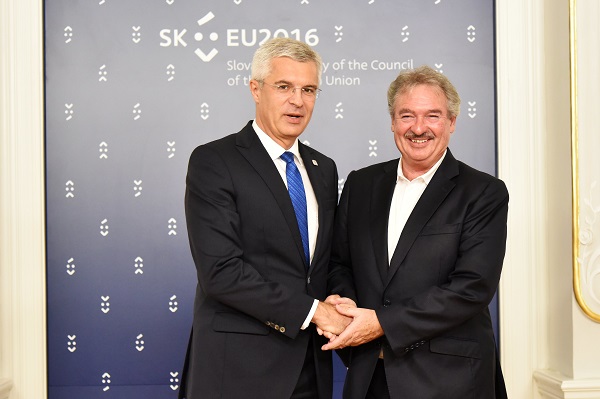
On Monday 25 July 2016, Luxembourg’s Minister of Foreign and European Affairs, Jean Asselborn, participated in the informal meeting for Ministers and State Secretaries for European Affairs held in Bratislava, Slovakia.
The ministers first had a thorough exchange of views on the main challenges facing the EU. They further touched upon on the implementation of the strategic programme for the Union decided upon at the European Council on 26 and 27 June 2014, i.e. the need to stimulate growth, increase investment, create more jobs of better quality, and encourage reforms for competitiveness.
Welcoming the EU's introspection process initiated by the Slovak presidency in the light of the latest developments of the European political agenda and the outcome of the recent British referendum, Minister Asselborn highlighted several priorities that prove essential for Luxembourg.
"First, a major challenge is to strengthen the social dimension of the EU, notably by ensuring significantly lower youth unemployment and reduce disparities of wealth, as well as the generation gap. (...) Secondly, it is necessary to make a collective and coordinated effort at European level to engage Europe on the path to economic recovery. An extension of the European Fund for Strategic Investment (SIEF) is essential (...) Third, we must accelerate progress on migration policy. We need sustainable solutions to implement in a responsible and sustainable manner. The commitments that have been made must be honoured. (...) Finally, I wish to stress the importance of the internal market. Concretely, we must ensure the indivisibility of the four freedoms of the internal market - that is to say the free movement of persons, goods, services and capital. Work on the road and come to the detachment and mobility are important and we need to accelerate work on the digital markets. "
The work of the ministers then focused on ways to enhance communication between the EU and its citizens. Minister Asselborn said that it is crucial to consider developing a clear message to convey regarding the current situation of the EU and its effective contribution to citizens, beyond the great founding principles that are taken for granted today.
"Citizens must understand the immediate effects every day and the cost of non-Europe," he said, explaining the need to do everything to bring citizens to pay more attention to community policies, and more explicitly highlighting what would prove beneficial for them in the short and long term.
"The rigorous application of the principles of subsidiarity and proportionality should enable the EU to move closer to citizens," he said, adding that "it will also be necessary to abandon the traditional top-down approach to move to a more participatory approach that would appeal to local and regional authorities, and citizens themselves, to have a concrete idea of their concerns and solutions they are considering. This will actually decentralise communication, organising debates at national level and also at regional and local levels to be close to citizens. "
Photo by eu2016.sk (L-R): Ivan Korčok, Secretary of State for Foreign and European Affairs in Slovaquia; Jean Asselborn, Minister for Foreign and European Affairs in Luxembourg








